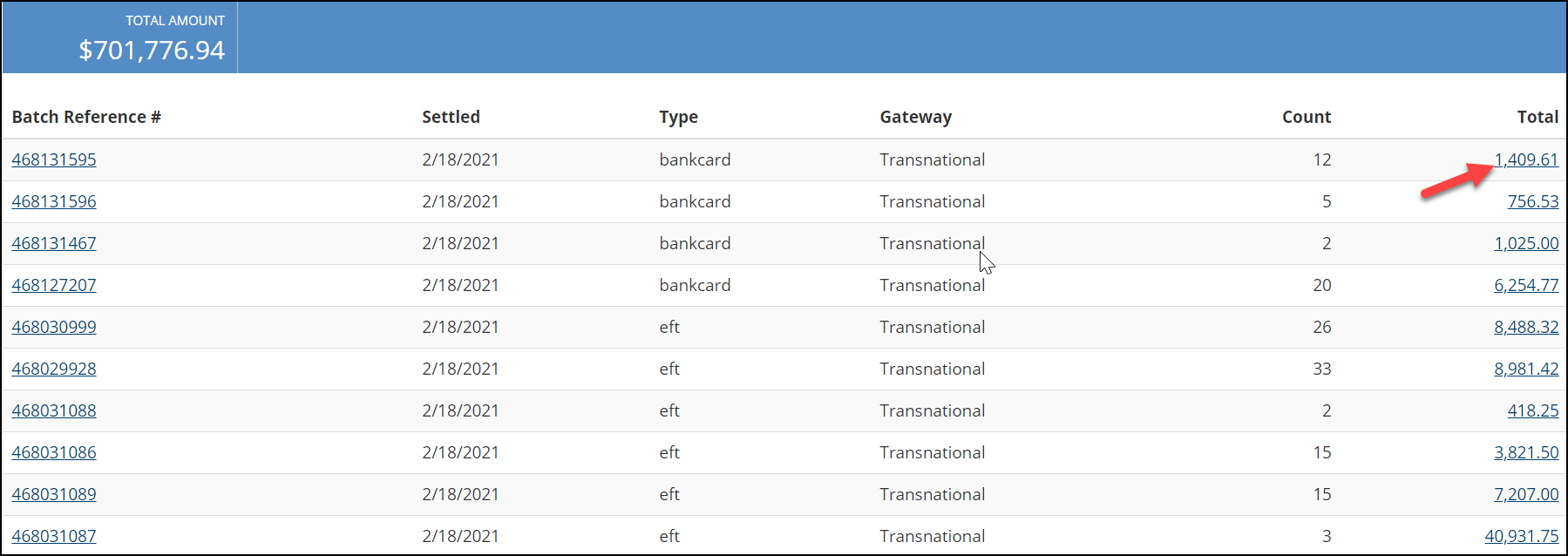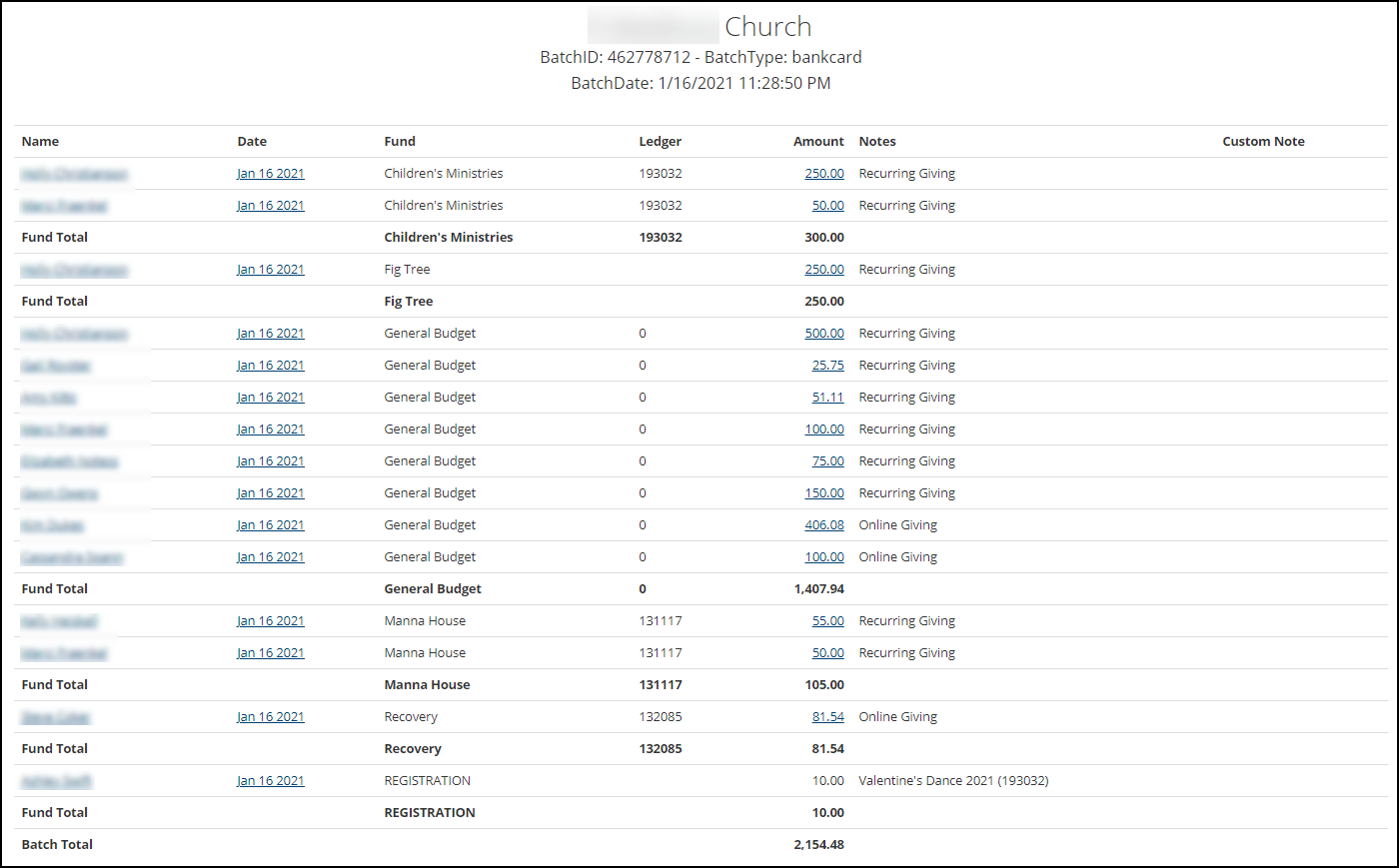Settlement Report¶
- Settlement Report¶
The Settlement Report shows details with fund subtotals for a batch. The report can be used as an aid in reconciliation and in general ledger entry. It includes a column for the fund’s Income Account (labeled as Ledger).
This Python script will create a report for a single settlement batch from your payment gateway. The report can be accessed from the Reconcile Report by clicking on the Total for the desired batch. The Settlement Report will present a header with the Batch Reference ID and the Batch Type (e.g., eft or bankcard) followed by the date and time the settlement batch was completed by the payment gateway.
Below the header will be the details of the batch with subtotals for each included fund. Registration payments will be in their own section with a subtotal. (For general ledger entry of registration payments, we recommend either the Totals by Description or the Totals by Batch/Description report.)
Some of the information shown on the report acts as links to further information. Links can be recognized by the blue color and the underlining.
Name links will open a new tab with that person’s profile.
Date links will open a new tab with the online transaction for that entry.
Amount links will open a new tab with the TouchPoint batch containing that contribution entry.

Settlement Report Link in Reconcile Report¶

Settlement Report¶
Configure the Settlement Report¶
The standard form of the Settlement Report is already loaded on your database. The administration setting CustomBatchReport, found under the Finance tab and in the Contribution Search section, points the system to the report. The value of this setting should be the URL to the Settlement Report, /PyScript/BatchReport?p1={batchref}. Or, if you have created an alternate settlement report, you can substitute into the setting the name of your settlement report (in place of BatchReport).
Run the Settlement Report¶
The link will display (as you see in the image above) in the Total column of the Reconcile Report. Click the link to display the report for that batch. The report will include information about online transactions with that batch reference.
If desired, you can use the print feature of your browser to print the report.
Code for the Settlement Report Python Script¶
1 2 3 4 5 6 7 8 9 10 11 12 13 14 15 16 17 18 19 20 21 22 23 24 25 26 27 28 29 30 31 32 33 34 35 36 37 38 39 40 41 42 43 44 45 46 47 48 49 50 51 52 53 54 55 56 57 58 59 60 61 62 63 64 65 66 67 68 69 70 71 72 73 74 75 76 77 78 79 80 81 82 83 84 85 86 87 88 89 90 91 92 93 94 95 96 97 98 99 100 101 102 103 104 105 106 107 108 109 110 111 112 113 114 115 116 117 118 119 120 121 122 123 124 125 126 127 128 129 130 131 132 133 134 135 136 137 138 139 140 141 142 143 144 145 146 147 148 149 150 151 152 153 154 155 156 157 158 159 160 161 162 163 164 165 166 167 168 169 170 171 172 173 174 175 176 177 178 179 180 181 182 183 184 185 186 187 188 189 190 191 192 193 194 195 | #Roles=Finance model.Title = 'Batch Report' sqlheader = ''' SELECT TOP 1 batch, batchref, batchtyp, Church = (SELECT Setting FROM dbo.Setting WHERE Id = 'NameOfChurch') FROM dbo.[Transaction] WHERE batchref = @P1 ''' sqlgifts = ''' DECLARE @Results TABLE ( TranId int, PeopleId int, Name nvarchar(138), Bold nvarchar(100), Fund nvarchar(256), Date varchar(11), Ledger nvarchar(25), Amount numeric(11,2), Notes nvarchar(256), CustomNote nvarchar(256), BundleHeaderId int ) ;WITH t AS ( SELECT Id FROM dbo.[Transaction] WHERE batchref = @P1 ), tc AS ( SELECT DISTINCT TranId, PeopleId FROM dbo.Contribution WHERE TranId IN (SELECT Id FROM t) AND ContributionTypeId <> 99 ), tp AS ( SELECT DISTINCT tp.Id, PeopleId FROM dbo.TransactionPeople tp JOIN t ON t.Id = tp.Id ), regdata AS ( SELECT t.Id [TranId], COALESCE((SELECT TOP 1 tp.PeopleId FROM tp WHERE tp.Id = t.Id), tl.LoginPeopleId) [PeopleId], COALESCE((SELECT TOP 1 p.Name FROM tp JOIN dbo.People p ON p.PeopleId = tp.PeopleId WHERE tp.Id = t.Id), tl.Name, tl.First + ' ' + tl.Last, 'Anonymous') [Name], tl.TransactionDate [Date], 'REGISTRATION' [Fund], ac.Code [GeneralLedger], ISNULL(tl.Amt, 0) - ISNULL(tl.donate, 0) [Amount], tl.Description [Notes], NULL [CustomNote], NULL [BundleHeaderId] FROM t JOIN dbo.TransactionList tl ON tl.Id = t.Id LEFT JOIN dbo.Organizations o ON o.OrganizationId = tl.OrgId LEFT JOIN lookup.AccountCode ac ON ac.Id = o.RegSettingXml.value('(/Settings/Fees/AccountingCode)[1]', 'varchar(12)') WHERE ((NOT EXISTS (SELECT NULL FROM tc WHERE tc.TranId = t.Id)) OR (ISNULL(tl.donate, 0) > 0 AND ISNULL(tl.amt, 0) > ISNULL(tl.donate, 0))) ), contdata AS ( SELECT c.TranId, c.PeopleId, p.Name [Name], c.ContributionDate [Date], CASE WHEN c.ContributionTypeId = 99 THEN ISNULL(ac.Description, '') ELSE f.FundName END [Fund], CASE WHEN c.ContributionTypeId = 99 THEN ISNULL(ac.Code, '') ELSE f.FundIncomeAccount END [GeneralLedger], c.ContributionAmount [Amount], tl.Description [Notes], c.Notes [CustomNote], bd.BundleHeaderId FROM dbo.Contribution c JOIN t ON t.Id = c.TranId JOIN dbo.ContributionFund f ON f.FundId = c.FundId JOIN dbo.People p ON p.PeopleId = c.PeopleId JOIN dbo.TransactionList tl ON tl.Id = t.Id JOIN dbo.BundleDetail bd ON bd.ContributionId = c.ContributionId LEFT JOIN lookup.AccountCode ac ON ac.Id = c.AccountCodeId WHERE EXISTS (SELECT NULL FROM tc WHERE tc.TranId = t.Id) AND c.ContributionTypeId <> 99 ), data AS ( SELECT * FROM regdata UNION SELECT * FROM contdata ) INSERT INTO @Results ( TranId, PeopleId, Name, Bold, Date, Fund, Ledger, Amount, Notes, CustomNote, BundleHeaderId ) SELECT TranId, PeopleId, CASE WHEN Name IS NOT NULL THEN Name WHEN Fund IS NOT NULL THEN 'Fund Total' ELSE 'Batch Total' END, CASE WHEN Name IS NULL THEN 'font-weight:bold' END, Date, Fund, GeneralLedger, SUM(Amount), Notes, CustomNote, BundleHeaderId FROM data GROUP BY GROUPING SETS((TranId, PeopleId, Name, Date, Fund, GeneralLedger, Notes, CustomNote, BundleHeaderId),(Fund, GeneralLedger),()) SELECT * FROM @Results ''' template = ''' <style> table.table.no-border td, table.table.no-border th { border-top: none; } </style> <table class="table centered"> <thead> {{#with header}} <tr> <td colspan="7"> <div class="text-center"> <h2>{{Church}}</h2> <h4>BatchID: {{batchref}} - BatchType: {{batchtyp}}</h4> <h4>BatchDate: {{batch}}</h4> </div> <br> </td> </tr> {{/with}} <tr> <th>Name</th> <th>Date</th> <th>Fund</th> <th>Ledger</th> <th class="right">Amount</th> <th>Notes</th> <th>Custom Note</th> </tr> </thead> <tbody> {{#each gifts}} <tr style="{{Bold}}"> {{#if PeopleId}} <td><a href="/Person2/{{PeopleId}}" target="_blank">{{Name}}</a></td> {{else}} <td>{{Name}}</td> {{/if}} {{#if TranId}} <td><a href="/Transactions/{{TranId}}" target="_blank">{{Date}}</a></td> {{else}} <td>{{Date}}</td> {{/if}} <td>{{Fund}}</td> <td>{{Ledger}}</td> {{#if BundleHeaderId}} <td class="right"><a href="/Batches/Detail/{{BundleHeaderId}}" target="_blank">{{Fmt Amount 'N2'}}</a></td> {{else}} <td class="right">{{Fmt Amount 'N2'}}</td> {{/if}} <td>{{Notes}}</td> <td>{{CustomNote}}</td> </tr> {{/each}} </tbody> </table> ''' Data.header = q.QuerySqlTop1(sqlheader) Data.gifts = q.QuerySql(sqlgifts) print model.RenderTemplate(template) |
Latest Update |
06/22/2023 |
Updated name of the report to Settlement Report
